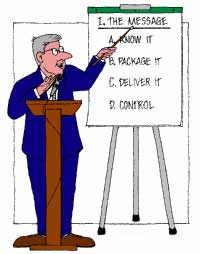“Lecterns have one reason for being: They hold up the speaker’s script. Sometimes they also hold up the speaker.”, says Ron Hoff in his presentations skills book, “I Can See You Naked”. My copy is a banged up, dogged eared, sticky papered second edition from 1992. It’s well worth the read, whether you are an occasional presenter, or a seasoned, “What could that book possibly teach me?” pro.
Professional development days, team off-sites and association conferences run amuck in the spring and, you–yes you–may have to “say a few words” at such an event, or–dare I even suggest it–deliver a full blown speech! A fate worse than death? Lots of studies say, “yes”. Repeatedly, studies site public speaking as the number one fear of most people, with death garnering only the 6th or 7th spot! As Jerry Seinfeld quips, “that means you would rather be in the casket than delivering the eulogy!” How do you feel about presenting? to your peers? strangers? associates? guests at a private life function? Are you more comfortable with some groups than others? Does the idea of presenting to any group freak you out? Does the thought of speaking into a microphone turn you gelatinous?
An April, 14, 2004, “Globe and Mail” article declared, “The crushing cost of fear…phobias affect more Canadians than heart disease or diabetes. Like most disorders, they don’t stay home when sufferers go to work.” This article referenced the professional demise of one individual, due to his fear of public speaking. “By the time I stood up in front of a group, I would be sweating uncontrollably–thank God for dark suits–shaking and my voice quivering.” He remembered “sitting in staff meetings so paralyzed with fear he was unable to speak. Adding any meaningful feedback required working up the courage just to open his mouth”. He confessed, “When I had formulated what I wanted to say, the discussion would have already moved on. I was so busy preparing to speak that I didn’t even notice. It was horrible for me. I can only imagine what to was like to watch.”
Some people are born with the “gift of the gab”. For this group of tongue waggers, being asked to speak at an event is merely a matter of “point me in the right direction”! For others, it’s often with mixed feelings, and a sense of impending dread that they accept this “kind offer”, afterwards, saying, “What just happened? Who was that that just agreed to speak?” It must have been my “evil twin sister/brother!”
If public speaking is not a regular part of your daily responsibilities it may cause you some stress. But, like anything else you repeatedly do or practice…you can get better–and even good–at it! According to Mark Twain, “There are two types of speakers: those that are nervous and those that are liars”. The good news is that you can work on minimizing any nervousness public speaking may cause.
Presenting with pizzazz and panache (not to mention authority, subject matter expertise and solid content) covers volumes, but, if it is your fate to speak at an event sometime this spring, you can at least start by answering these questions:
- What do I have in common with these people? The answer may be obvious. If it is…go deeper. If you sincerely don’t know…explore. Perhaps you’re from the same generation and can assume a shared history? same professional background? education? objectives? Find what you can with which to relate to your audience.
Create something in common, with at least a few of your audience members, before you start. I suggest that, wherever possible, make yourself available for informal “hellos” and casual handshakes before you’re “on”. This way you’ll have already made some “friends” in the crowd before you’ve begun. Casting your eyes on these friendly faces may help you relax and get on with it. These “lucky” people would also probably be willing volunteers (should you have a need), because you had already established connection.
- Why was I invited to give this speech? A cynic might reply, “Because no other sucker would say yes!”, but, come on now…you know you bring good “stuff” to the table–admit it…to yourself and then share it with others.
- What do I want them to do differently because of my speech? Articulate this to yourself (and, if you like, aloud during your presentation), and then ensure that your opening and closing comments ask for the change you’d like to see.
- What does my audience most need to hear from my message, right now? hope? information? facts? support? clarity? ideas? solutions? strategies? light heartedness or entertainment? Ask a random sampling of those who will be in your audience, ahead of time, if you don’t know instinctively, and then give it to them.
- What picture can I create to serve as a central illustration of my message? What metaphors, similes or analogies can you use to make your message grasp-able and meaningful (consider songs, stories, fables, and movies, as well as baking, driving and sporting metaphors).
- What do I want out of this speech? Note the question is not, “Do I want out of this speech?” (to which your answer might be “yes!”), but, rather, “What do I want to get out of this speech? learn? feel? Perhaps it’s to triumph over your fear of public speaking, or to increase your profile or move a cause forward.
- What single message or sentence could sum up my speech? What is the single most important piece of information or feeling you’d like your audience to embrace because of your words? This can be a “toughie”, but give it thought; you may just come up with a succinct answer!
- What’s the biggest fear I have about giving this speech? Then ask yourself, “What are the odds of that happening?” People are afraid that they may look silly, “stupid” or nervous, or that the audience won’t “play” with them, or that they’ll forget everything they’re suppose to say. Preparation and practice, practice, practice will take away much of one’s fear of appearing foolish or forgetting. Throw yourself into as many practice opportunities as possible, beforehand, so that when the chips are down the ole “fear button” is flattened.
Were you a little frightened about your first few days on your current job? But now? Now you’re an old pro, doing it with one arm behind your back, while multi-tasking five other activities…right? As for the audience not wanting to “play”…the majority of audiences are willing to drink up what you have to share. They don’t have time to waste. They want you to be good and share what it is you have to share. After all, you are the subject matter expert that’s been ushered to the podium–right? It’s a very rare audience that is full of hostile people with arms crossed and scowling faces which read, “Just try to tell me something I don’t already know! Just try to make me laugh, show me the way, explain your ideas to me, etc.!”. Although…this did happened to me once…I was the closing keynote speaker at an organization’s annual off-site. The program was already running an hour behind when the president said a few words before my address…and what a few humdinger words they turned out to be! Unbeknown to me, he dropped a bomb shell of bad news…and then said, “and now, heeeere’s Nina Spencer on “Positive Thinking: Attitude is Everything”! You could have heard a pin drop. What could I do? The “show must go on”! So I sang, “When the moon hits your eye like a big pizza pie that’s…Amore…”!
You can please some of the people all of the time and all of the people some of the time, but you ain’t never gonna please all of the people all of the time! You do the best you can. Deliver what you promise (to yourself and to your audience). Learn from all of your speaking experiences
(eg. now I sweetly ask every client, “Will you be sharing any shocking news before I take the podium?”). Be responsible to your audience but not for them. - What can I say that will touch the top 20% of my audience? If you are speaking to 100 people, it’s hard to tell what percent are really absorbing your words–maybe 66%?, 80%?; if you’re really lucky, even more. If some aren’t listening, it’s nothing personal, most of the time–people have a lot on their plates and minds and often times don’t give anything 100% attention when under pressure. There may be times when you are speaking to only 20 of those 100 people…but you don’t know which 20 they are, so you share all your pearls with all of your participants, with equal commitment, conviction, gusto and honour; like throwing 100 seeds upon the soil and hoping that 20 “take”. Indeed, those 20 will help to spread your message…and perhaps make the other 80 wish they’d paid more heed!
In addition to these preparatory suggestions, work hard to get from behind that “lethal lectern”. It’s a barrier between you and your audience. You know more than you think you do and, what’s more, you also know how to talk on your subject(s), naturally and conversationally…without the stiltedness of notes. You don’t really need notes; all you really need to do is believe it!
Nina Spencer is a business/motivational keynote speaker, and workshop facilitator, specializing in interpersonal communications and rebuilding workplace passion. Nina can be reached at 416-588-3334. To book Nina’s keynote or workshop services for your organization’s event, visit
ninaspencer.com
or email
nina@ninaspencer.com
Please send an email to let me know the name of the publication, the date the reprint will appear, and a hard copy of the publication would be greatly appreciated as well.














